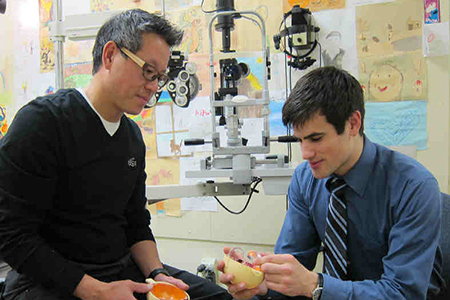To you a crowded waiting room may be distressing but to doctors, physical therapists and other health care providers it’s a visible sign of success. People get sick and injured no matter what’s happening with the economy and this is only one reason why a career in health care remains so popular.
In fact says Charles Kunert, dean of the College of Theology Arts and Sciences at Concordia University in Oregon the additional stress of a poor economy may deepen the need for health care. Additionally if current efforts to make health insurance more accessible are successful the demand for these types of services should increase.
According to Frank Mittermeyer, director of the Center for Health Professions at Elmhurst College, “There are shortages in every health care field from doctors and nurses to medical assistants and clinical lab technologists – for that reason … these careers are hot.”
Professional Schools (Medicine Dentistry Optometry and Pharmacy)
Several health professions like medicine dentistry optometry and pharmacy require a four-year undergraduate degree followed by admission to a professional school. These health professions require you to pass a licensure exam before you can practice professionally.
Note that there really isn’t a formal premed or pre-dentistry major. You’ll need to pick a major while making absolutely sure you’ve taken the courses required by the medical or other professional school (for example you’ll inevitably need to take certain science courses).
Becoming a doctor isn’t easy but the rewards can be well worth it. You’ll need an undergraduate degree plus four years of medical school to earn a doctorate in medicine (better known as an MD). This schooling plus an internship and residency in a specialty area usually takes about 10 to 12 years to complete. The payoff: Earnings for doctors and surgeons are the highest among all professions.
Pharmacists will continue to be in high demand for an aging population in need of prescription drugs. Employment of pharmacists is expected to grow by 22 percent between 2006 and 2016. A Doctor in Pharmacy (PharmD) is required which takes a minimum of six years to complete.
Optometrists or eye doctors earn a Doctor of Optometry (OD) and help patients improve their vision by prescribing glasses and contacts. They work to prevent eye diseases by detecting problems early through eye exams.
Don’t want to put in the time it takes to become a doctor or one of these other professionals? Not to worry-there are still plenty of rewarding health care professions for you to choose from.
Nursing
“Registered nurses are the backbone of the nation’s health care system including hospitals and community clinics,” says Marla Weston, RN CEO of the American Nurses Association.
Nurses hold roughly 2.5 million jobs. But despite the large number of nurses the shortage of registered nurses (RNs) in the United States could reach as high as 500000 by 2025 according to a 2008 report entitled “The Future of the Nursing Workforce in the United States: Data Trends and Implications.”
There are two major paths to becoming a registered nurse: an associate’s degree program which can be completed in two years of full-time study or a bachelor’s degree program which can typically be completed in four years of full-time study. A bachelor’s degree in nursing will increase opportunities for leadership and advancement within the field.
There is also an exceptionally high need for experienced nurses with a master’s or doctoral degree to teach the next generation of nurses.
Physician Assistants
Physician assistants (PAs) work in hospitals and doctors’ offices and do many tasks that doctors do- even prescribe medicine in some states – but do not attend medical school. Instead they attend physician assistant programs and can enter the profession with a bachelor’s or master’s degree. While the pay may not be quite as high as a doctor’s it’s far from sickly with median annual earnings of $74,980.
Another benefit for physician assistants is the diversity of their daily work. PAs can conduct physical exams diagnose and treat diseases order and interpret tests counsel on wellness and assist in surgical procedures.
Physical Therapists
Physical therapists help people regain their mobility after injury through physical rehabilitation. Baby boomers have not only begun to retire but they also wear out joints and suffer other degenerative diseases. They’re now getting their hips knees and shoulders replaced and physical therapists play a vital role in helping these patients rehabilitate after surgery.
There are two ways to enter the profession: either at the master’s level with a master’s degree (MPT MSPT MS) or at the doctoral level with a Doctor of Physical Therapy (DPT) degree.
“Being a physical therapist allows you a lot of flexibility. There is so much you can do: sports-based therapy geriatric outpatient hospital-based corporate-based physical therapy and more. It’s also very rewarding. You get to help people feel better and it makes a lot of difference,” says Kerrie Brooks, a physical therapist with a DPT degree and a private practice in Jupiter FL.
Health Care Administration
Another career option in health is health care administration. Administrators are responsible for the business management of health care facilities. Bachelor’s degree programs in public health and health care administration qualify students for jobs in settings such as state and regional health care agencies biomedical companies and nonprofit organizations. However many jobs in public health and health care administration require an advanced degree.
“If you like working with a community a group or a population as opposed to one-on-one encounters then you would probably be at tracted to public health,” says Georgeen Polyak, master of public health program coordinator and associate professor at Benedictine University.
Interested in a career in health care but prefer to focus on technology? The newest additions to the health care professional roster include medical record professionals and health information technicians. People in these positions manage patient record databases and perform quality assurance on the records. These jobs are being created as electronic records and medical technology advancements continue to become the norm.
Mental Health
Mental health counselors social workers and psychologists all help people cope with mental health problems. Mental health counselors are required to have a master’s degree in counseling. After completing the master’s degree students can take an exam to earn a professional title of Licensed Professional Counselor (LPC) or Licensed Mental Health Counselor (LMHC). Titles vary by state.
To become a social worker you need a bachelor’s degree in social work (BSW)-though a master’s degree (MSW) is required for many positions. Social workers often specialize in different areas such as children and families or substance abuse and many positions are with local and state agencies.
Psychologists have the longest training in the mental health field: they must hold a doctorate in psychology (either a PhD or a PsyD) and they must complete a one-year internship prior to practicing. Graduate study takes five to seven years to complete.
“There is a better understanding now of how the mind and body work together. This broader view of medical treatment is leading to an increase in job opportunities in the whole area of health psychology,” says Linda Applegarth, a practicing psychologist at New York-Presbyterian Hospital.
What to Do if You’re Undecided
If you are curious about a career in the health professions but aren’t sure which career is for you “shadow” health care professionals. Contact local health care professionals and ask if you can observe their work.
Chrissy Spenser, assistant professor of biology at Lees-McRae College offers this advice: “Try to do a summer internship. This way you can get an inkling of whether you like a career or it’s not for you. Nothing you do as an undergraduate will commit you to a course for life so you need to experiment to see what you want to do.”
Adds Mark Scott, director of media relations at Hendrix College, “The more you’ve demonstrated your willingness to learn and get involved in the extra steps to be successful the better you’ll look to schools.”
Whichever career path you decide is right for you you can’t go wrong working to help others as a health care professional.
| Median Earnings for Health Professions | |
|---|---|
| Dentist | $136,960 |
| Health Care Administrator | $73,340 |
| Nurse | $52,280 |
| Mental Health Counselor | $34,380 |
| Optometrist | $91,040 |
| Pharmacist | $94,520 |
| Physician Assistant | $80,356 |
| Physical Therapist | $66,200 |
| Anesthesiologist | $259,948 |
| Family Practice Physician | $137,119 |
| General Surgeon | $228,839 |
| Obstetrician/Gynecologist | $203,270 |
| Psychiatrist | $173,922 |
| Social Worker | $35,410 |
Aimee Heller is a freelance writer in New York City and Miami.



